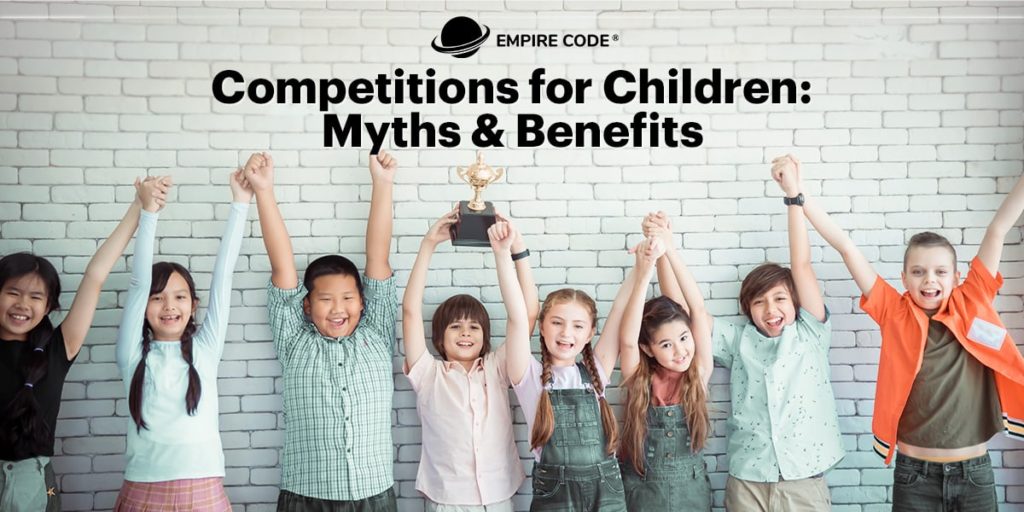
Competition is present in every aspect of our lives. There is always a debate about whether competitions are useful for education and learning. To some, it is deemed unhealthy, due to the overwhelming pressure that it imposes on kids. This can be true at times, especially when there is overwhelming focus on the idea of winning. This article aims to debunk some of the myths surrounding competitions and explore their importance in contributing to learning.
Myth 1: Competition is the antonym of collaboration
Competing with other people doesn’t always mean that you are ‘defeating’ others to win. Well-structured and healthy competitions foster collaboration and teamwork to solve problems. Taking on challenging tasks as a team trains communication and teamwork skills in children, and teaches them how to work with people with different skill sets. They learn to add value to one another, extend grace when a mistake is made, and try to find solutions together as a team.
Myth 2: Competition will degrade my child’s self-esteem if he/she loses
How about we try to look at this from a different angle? Firstly, competitions are a great avenue for children to understand what they’re good at and what they like. It also provides many opportunities for children to showcase their skills through solving challenging missions and tasks.
Secondly, competition exposes children to experience uncertainty and failure, which they will eventually experience at a point in their lives. Thus, such experiences allow them to understand that failure is not a bad thing, but their response to failure is what matters. Instead of being fixated on the outcome of failure, competitions can teach kids to see value in the process and their growth rather than the results. Healthy competitions aim to provide such platforms for children to keep failing and keep trying, hoping to increase their willingness to venture into new ideas, expand their creativity and cultivate resilience- the very traits which foster success.
Myth 3: My child learns enough in school, so competitions are not important for his/her future
Although lessons and tests in school do improve learning and the acquisition of knowledge, this traditional method of learning reduces opportunities for children to think critically. Such passive learning styles can build up bad habits of plainly memorizing content to achieve good grades. Hence, in situations that require students to think, they will tend to expect someone to tell them what to do instead of analyzing the situation and coming up with a proper solution. In competitions where children are exposed to problems, it challenges them to take ownership of the problem and critically think of appropriate solutions.
Benefits of participating in competitions
Aside from critical thinking and problem-solving skills, being involved in many competitions also builds up soft skills such as communication, teamwork, and organizational skills that are beneficial for the future. Applying knowledge learnt in the classrooms and extending it to solve real-life problems also strengthens memory and learning capacity. Such skills prepare children for the real world.
Another plus point of competition is that it is very valuable in applying for schools and jobs. Recruiters value soft skills beyond the number of As on one’s report card, and such skills can be shown through being involved in competitions. Whether it’s your response in dealing with a problematic team member or solving an extremely difficult challenge, such experiences prove to recruiters that one has more positive traits they can bring to the job role, beyond just studying and getting good grades.
How we view competitions at Empire Code
At Empire Code, we strongly encourage our students to take part in competitions to gain exposure, build on their skills and boost their DSA portfolio. We train students how to cultivate good sportsmanship, think critically and work with people of different skills and backgrounds. Taking into consideration the risks of competition, we always tell our students that their growth process is more important than just bringing trophies home. We ensure that such values are communicated to our students every time they join competitions. At the end of the day, we will celebrate whether or not our students bring home a trophy!
Join our upcoming competitions and train with us now!
References
10 Ways Competitions Enhance Learning: Institute of Competition Sciences. Institute of Competition Sciences | The Home of Challenge Based Learning. (2017, November 17). Retrieved March 10, 2022, from https://www.competitionsciences.org/2016/07/04/10-ways-competitions-enhance-learning/
Gordon, S. (2020, September 17). Is competition a good thing or a bad thing? Verywell Family. Retrieved March 10, 2022, from https://www.verywellfamily.com/competition-among-kids-pros-and-cons-4177958
Make The Change. (2021, February 23). 5 benefits of joining Youth Competitions. Make The Change. Retrieved March 10, 2022, from https://www.makethechange.sg/post/5-benefits-of-joining-youth-competitions
McGuinness, D. (n.d.). Why competition is good for kids (and how to keep it that way). Parents. Retrieved March 10, 2022, from https://www.parents.com/kids/development/social/why-competition-is-good-for-kids-and-how-to-keep-it-that-way/
Why competition is good for students. MindChamps. (2020, June 9). Retrieved March 10, 2022, from https://www.mindchamps.org/blog/why-competition-good-for-students/
